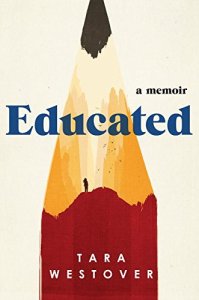Title: Educated
Author: Tara Westover
Genre: Memoir
Trigger Warnings: Physical abuse, child abuse, childhood neglect, traumatic injury, fire/burn injury, car crashes, blood, gore, medical procedures (mentions), mental illness
Read To: 46%
Back Cover:
Tara Westover was 17 the first time she set foot in a classroom. Born to survivalists in the mountains of Idaho, she prepared for the end of the world by stockpiling home-canned peaches and sleeping with her “head-for-the-hills bag”. In the summer she stewed herbs for her mother, a midwife and healer, and in the winter she salvaged in her father’s junkyard.
Her father forbade hospitals, so Tara never saw a doctor or nurse. Gashes and concussions, even burns from explosions, were all treated at home with herbalism. The family was so isolated from mainstream society that there was no one to ensure the children received an education and no one to intervene when one of Tara’s older brothers became violent.
Then, lacking any formal education, Tara began to educate herself. She taught herself enough mathematics and grammar to be admitted to Brigham Young University, where she studied history, learning for the first time about important world events like the Holocaust and the civil rights movement. Her quest for knowledge transformed her, taking her over oceans and across continents, to Harvard and to Cambridge. Only then would she wonder if she’d traveled too far, if there was still a way home.
Educated is an account of the struggle for self-invention. It is a tale of fierce family loyalty and of the grief that comes with severing the closest of ties. With the acute insight that distinguishes all great writers, Westover has crafted a universal coming-of-age story that gets to the heart of what an education is and what it offers: the perspective to see one’s life through new eyes and the will to change it.
Review:
I really thought this was going to be a topical memoir along the lines of The Gentle Art of Swedish Death Cleaning (a memoir about decluttering as a way of setting your affairs in order) or Autism in Heels (a memoir about how autism affects women differently than men). I thought it was going to be told through the story of Tara’s life, but focusing on how she got no education in childhood and so went on to educate herself and get college degrees and such.
And it’s really not. It’s the story of her life and her childhood – the full story, expanded on to the best of her memory and from talking to other family members. By the time I stopped, Tara had just taken the ACT and her score wasn’t good enough to get into a college so she was going to keep studying and take it again. The rest of it was her childhood with her family – their prepper-style anticipation of the apocalypse, her father’s hatred of the government and possible mental illness, her mother’s herbalism and more “woo-woo” healing and unexpressed disagreement with her father, her siblings living, working, and leaving (or not), and their complete and utter rejection of medical care and education.
There is a lot in this book. A lot of abuse, neglect, and horrible things a child shouldn’t have to go through. In many places, it was hard to read. But it’s not a bad book – I absolutely see how it became so popular. It’s told well and highly engaging.
So why did I stop reading? Mainly that it wasn’t a topical memoir like I expected. It was much longer than I bargained for and put much less emphasis on the education part of Tara’s childhood. I had gone in hoping to find someone like me who taught themselves much of their schooling (despite my homeschooling parents actually attempting to give me an education, by the time I was thirteen my mother was focused on my younger siblings and I taught myself high school). It isn’t at all bad, just not what I expected or wanted.
For a few days I was on the fence about finishing it, and then someone put a hold on it at the library and that made up my mind. I’m not discounting the possibility that I may come back and finish it someday, when I’m more in the mood for the story of a childhood among rural apocalyptic preppers. But for right now, I’m putting it down.

